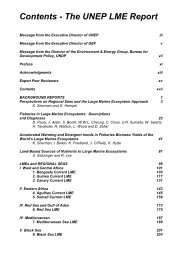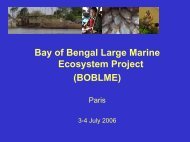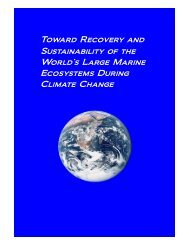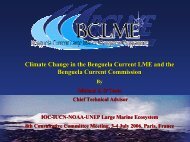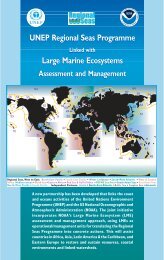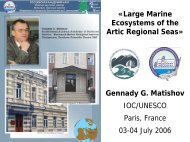Sustaining the World's Large Marine Ecosystems
Sustaining the World's Large Marine Ecosystems
Sustaining the World's Large Marine Ecosystems
You also want an ePaper? Increase the reach of your titles
YUMPU automatically turns print PDFs into web optimized ePapers that Google loves.
Landings in Baltic Sea LME<br />
Figure 3. Fish landings in <strong>the</strong> Baltic Sea. Herring and cod are <strong>the</strong> most important fish species.<br />
From <strong>the</strong> SeaAroundUs Project at www.seaaroundus.org.<br />
As a result of management failures due to <strong>the</strong> managing agencies setting cod<br />
total allowable catches (TACs) that have frequently exceeded <strong>the</strong> levels advised<br />
by ICES, <strong>the</strong> stock size of Baltic Sea cod reached its lowest level on record in<br />
1991. Levels since <strong>the</strong>n and up to 2007 have been close to this historic<br />
minimum. Overfishing of larger fish-eating fish, e.g. cod, has allowed increased<br />
industrial fishing of sprat and herring. The economic yield per unit biomass of <strong>the</strong><br />
fishery has declined, with a smaller proportion of <strong>the</strong> catch being directed for<br />
human consumption and food security. Unsustainable fishing has also caused<br />
fur<strong>the</strong>r impacts on marine ecosystems through by-catch and <strong>the</strong> discarding of<br />
fish, and on bottom living animals, seabirds and marine mammals. Bottom<br />
trawling has degraded vulnerable habitats. This has had a negative impact on<br />
ecosystem structure and function. Fisheries enforcement has been ineffective<br />
against bad fishing practices. Catch statistics misreport landings outside legal<br />
channels to <strong>the</strong> detriment of official statistics on catches and landings, <strong>the</strong><br />
exceeding of quotas, fishing in closed areas and unacceptable discards. Where<br />
regional international regulatory commissions have agreed on remedial actions,<br />
<strong>the</strong>re has often been a lack of political will at <strong>the</strong> national level to fully implement<br />
agreed actions to restore depleted fish stocks and protect marine ecosystems.<br />
However, in <strong>the</strong> last two years, public awareness of <strong>the</strong> Baltic and its fish and<br />
fisheries, especially cod, has grown considerably in most of <strong>the</strong> Baltic riparian<br />
countries. The media has dealt in detail with <strong>the</strong> failure of <strong>the</strong> Common Fisheries<br />
Policy, and in Sweden, for example, <strong>the</strong> publication of <strong>the</strong> book “Tyst Hav” (Silent<br />
72



